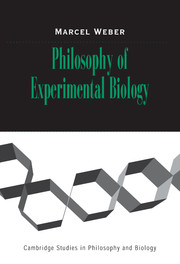Book contents
- Frontmatter
- Contents
- Preface
- Acknowledgements
- 1 Introduction
- 2 Reductionism and the Nature of Explanations
- 3 Discovery: Solving Biological Problems
- 4 Scientific Inference: Testing Hypotheses
- 5 Experimental Systems: A Life of Their Own?
- 6 Model Organisms: Of Flies and Elephants
- 7 Reference and Conceptual Change: Out of Mendel's Garden?
- 8 Developmental Biology and the Genetic Program: Explaining Ontogeny
- 9 Scientific Realism: In Search of the Truth
- Notes
- Bibliography
- Index
Preface
Published online by Cambridge University Press: 08 July 2009
- Frontmatter
- Contents
- Preface
- Acknowledgements
- 1 Introduction
- 2 Reductionism and the Nature of Explanations
- 3 Discovery: Solving Biological Problems
- 4 Scientific Inference: Testing Hypotheses
- 5 Experimental Systems: A Life of Their Own?
- 6 Model Organisms: Of Flies and Elephants
- 7 Reference and Conceptual Change: Out of Mendel's Garden?
- 8 Developmental Biology and the Genetic Program: Explaining Ontogeny
- 9 Scientific Realism: In Search of the Truth
- Notes
- Bibliography
- Index
Summary
In the century between the rediscovery of Mendel's laws (1900) and the completion of the Human Genome Project (2001), biology has come a very long way. During this time, biologists have made spectacular advances in understanding the cellular and molecular basis of life. This knowledge has considerable potential for improving people's lives – a potential that is only beginning to be realized. Thus, in terms both of the knowledge it produces and of the technological opportunities it offers, modern experimental biology is one of the most successful scientific endeavors of all time. Yet remarkably little is known about its epistemology and the underlying metaphysics.
This book explores some central philosophical issues concerning scientific research in modern experimental biology, that is, in areas such as genetics, biochemistry, molecular biology, microbiology, neurobiology, and developmental biology. Evolutionary theory – traditionally the center of attention in the philosophy of biology – only appears marginally, and only where it is relevant to understanding experimental biology. There already exists a massive amount of philosophical literature on evolutionary theory (including a book by this author, Weber 1998a), while experimental biology has not received the philosophical attention that it deserves and needs.
In addition to filling this gap, the present work also reveals a certain independence of experimental biology from evolutionary theory. This is not necessarily to imply that Theodosius Dobzhansky was mistaken when he said, “Nothing in biology makes sense except in the light of evolution,” but perhaps that there are different ways of making sense of things.
- Type
- Chapter
- Information
- Philosophy of Experimental Biology , pp. xiii - xivPublisher: Cambridge University PressPrint publication year: 2004

